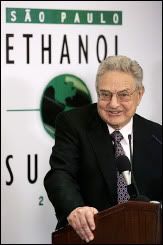Soros invests US$900 million in Brazilian biofuels, calls on US, EU to end tariffs
 Investment tycoon George Soros said Tuesday at the first Ethanol Summit in São Paulo, that he is investing US$900 (€666) million in the production of ethanol in Brazil, and demanded that the US and EU open their markets for biofuels produced in the South American country.
Investment tycoon George Soros said Tuesday at the first Ethanol Summit in São Paulo, that he is investing US$900 (€666) million in the production of ethanol in Brazil, and demanded that the US and EU open their markets for biofuels produced in the South American country.Putting an end to barriers in developed nations would help eliminate a 'paradox' that leaves an excess supply of ethanol in Brazil and a "hunger for biofuels across the world," he said at the Summit, organised by UNICA (and earlier post). The seminar at which the billionaire participated was aimed at studying the global market for alternative fuels. The United States produces ethanol from corn, while Brazil makes its variant from sugar cane which is many times more efficient.
Regardless of the potential market risks, Soros said ethanol is "competitive with gasoline" as it's much more environment-friendly, and that he plans to continue investing in its production. Brazil "has the capacity to increase its ethanol production ten-fold", but there are problems to overcome, Soros said. The Brazilian market for ethanol is almost saturated, so exports are essential for industry growth. But trade barriers from other countries dampen exports, the investor said.
The Hungarian-born investor is putting around US$900 million in a 150,000 hectare (370,500 acres) ethanol production project in Mato Grosso do Sul, which will be one of the largest mill complexes in Brazil. Soros' Adeco Agropecuaria Brasil will build three ethanol refineries in a first stage.
Soros accused Washington of protecting US corn producers with its tariffs on ethanol, regardless of efficiency in terms of energy. He noted that the energy balance of corn ethanol very weak, whereas that of sugar cane is eight to ten times better. Consequently, the greenhouse gas balance of the Brazilian variant is much stronger too (earlier post):
 biomass :: bioenergy :: biofuels :: energy :: sustainability :: ethanol :: sugarcane :: tariff :: Brazil ::
biomass :: bioenergy :: biofuels :: energy :: sustainability :: ethanol :: sugarcane :: tariff :: Brazil :: The United States and the European Union levy high tariffs on Brazil's ethanol, which makes it expensive. The question is "how to open up the market in the USA, Europe and Japan," and how "to create an environment with stable prices," Soros said. He believes that politicians in the US and Europe will eventually reduce or eliminate the tariffs that make Brazilian ethanol exports expensive as the world turns increasingly to biofuels over fossil fuels. He said he hopes the issue of tariffs is solved, "to make investment in ethanol really viable."
The United States, Brazil's largest foreign buyer of its ethanol, imposes a 54 cent per gallon tariff on direct Brazilian ethanol imports, roughly equivalent to the production costs of the Brazilian biofuel. The European Union levies a tariff of around 19 eurocents
When U.S. President George W. Bush visited Brazil in March, Brazilian President Luiz Inacio Lula da Silva appealed to him to reduce the tariff. Bush replied that it was a matter for Congress to decide.
Nonetheless, well over half of the 1.8 billion liters of ethanol shipped to the U.S. market from Brazil entered directly in 2006 because of the fuel's relatively low price in Brazil.
"Civilization's dependence on petroleum gives rise to problems. We are discovering less oil than we are using and there is a real tightness in the market, which requires finding alternatives," Soros said.
Former Brazilian President Fernando Henrique Cardoso, who headed the panel on global warming in which Soros spoke, said Brazil has begun to revise its position on global warming.
"We are all today responsible. In the past, Brazil's position was that the developed world was to blame for warming -- why should we pay?" said Cardoso. "And it was a common attitude of the past to see pollution as a sign of development."
"We are in the process of reconstituting the basis of civilization, which until now has worked under the premise that existing energy sources were permanent," he said.
More information:
BBJ Hungary: George Soros to invest $900 million in Brazilian ethanol - extended - June 6, 2007.
Reuters: Soros says he is a speculator in Brazilian ethanol - June 5, 2007.
Bloomberg: Ethanol Tariffs Create Brazil Oversupply, Soros Says (Update2) - June 5, 2007.
 --------------
--------------
 Royal Dutch Shell Plc is expanding its fuel distribution infrastructure in Thailand by buying local petrol stations. The company will continue to provide premium petrol until market demand for gasohol (an petrol-ethanol mixture) climbs to 70-90%, which will prove customers are willing to switch to the biofuel. "What we focus on now is proving that our biofuel production technology is very friendly to engines", a company spokesman said.
Royal Dutch Shell Plc is expanding its fuel distribution infrastructure in Thailand by buying local petrol stations. The company will continue to provide premium petrol until market demand for gasohol (an petrol-ethanol mixture) climbs to 70-90%, which will prove customers are willing to switch to the biofuel. "What we focus on now is proving that our biofuel production technology is very friendly to engines", a company spokesman said.








0 Comments:
Post a Comment
Links to this post:
Create a Link
<< Home